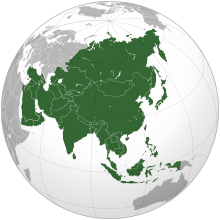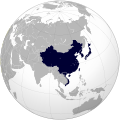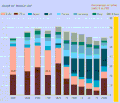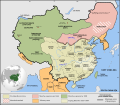
 Asia (/ˈeɪʒə/ AY-zhə, UK also /ˈeɪʃə/ AY-shə) is the largest continent in the world by both land area and population. It covers an area of more than 44 million square kilometers, about 30% of Earth's total land area and 8% of Earth's total surface area. The continent, which has long been home to the majority of the human population, was the site of many of the first civilizations. Its 4.7 billion people constitute roughly 60% of the world's population. Asia shares the landmass of Eurasia with Europe, and of Afro-Eurasia with both Europe and Africa. In general terms, it is bounded on the east by the Pacific Ocean, on the south by the Indian Ocean, and on the north by the Arctic Ocean. The border of Asia with Europe is a historical and cultural construct, as there is no clear physical and geographical separation between them. It is somewhat arbitrary and has moved since its first conception in classical antiquity. The division of Eurasia into two continents reflects East–West cultural, linguistic, and ethnic differences, some of which vary on a spectrum rather than with a sharp dividing line. A commonly accepted division places Asia to the east of the Suez Canal separating it from Africa; and to the east of the Turkish Straits, the Ural Mountains and Ural River, and to the south of the Caucasus Mountains and the Caspian and Black seas, separating it from Europe. China and India traded places as the largest economies in the world from 1 to 1800 CE. China was a major economic power for much of recorded history, with the highest GDP per capita until 1500. The Silk Road became the main east–west trading route in the Asian hinterlands while the Straits of Malacca stood as a major sea route. Asia has exhibited economic dynamism as well as robust population growth during the 20th century, but overall population growth has since fallen. Asia was the birthplace of most of the world's mainstream religions including Hinduism, Zoroastrianism, Judaism, Jainism, Buddhism, Confucianism, Taoism, Christianity, Islam, Sikhism, as well as many other religions. (Full article...) Featured article K-pop (Korean: 케이팝; RR: keipap), short for Korean popular music, is a form of popular music originating in South Korea as part of South Korean culture. It includes styles and genres from around the world, such as pop, hip hop, R&B, rock, jazz, gospel, reggae, electronic dance, folk, country, disco, and classical on top of its traditional Korean music roots. The term "K-pop" became popular in the 2000s, especially in the international context. The Korean term for domestic pop music is gayo (가요; 歌謠), which is still widely used within South Korea. While "K-pop" can refer to all popular music or pop music from South Korea, it is colloquially often used in a narrower sense for any Korean music and artists associated with the entertainment and idol industry in the country, regardless of the genre.[contradictory] The more modern form of the genre, originally termed "rap dance", emerged with the formation of the hip hop boy band Seo Taiji and Boys, in 1992. Their experimentation with different styles and genres of music and integration of foreign musical elements helped reshape and modernize South Korea's contemporary music scene. (Full article...)Selected Country Yemen (/ˈjɛmən/ ; Arabic: ٱلْيَمَنْ, romanized: al-Yaman), officially the Republic of Yemen, is a sovereign state in West Asia. Located in the southern Arabian Peninsula, it borders Saudi Arabia to the north, Oman to the northeast, and the Indian Ocean to the south, sharing maritime borders with Eritrea, Djibouti and Somalia across the Horn of Africa. Covering roughly 528,000 square kilometres (203,861 square miles), with a coastline of approximately 2,000 kilometres (1,200 miles), Yemen is the second largest country on the Arabian Peninsula. Sanaa is its constitutional capital and largest city. Yemen's estimated population is 34.7 million, comprised mostly of Arab Muslims. It is a member of the Arab League, the United Nations, the Non-Aligned Movement and the Organisation of Islamic Cooperation. Owing to its geographic location, Yemen has been at the crossroads of many civilisations for over 7,000 years. In 1200 BCE, the Sabaeans formed a thriving commercial kingdom that included parts of modern Ethiopia and Eritrea. In 275 CE, it was succeeded by the Himyarite Kingdom, which spanned much of Yemen's present-day territory and was heavily influenced by Judaism. Christianity arrived in the fourth century, followed by the rapid spread of Islam in the seventh century. Yemenite troops playing a crucial role in early Islamic conquests. Various dynasties emerged between the 9th and 16th centuries. During the 19th century, the country was divided between the Ottoman and British empires. After World War I, the Mutawakkilite Kingdom of Yemen was established, which in 1962 became the Yemen Arab Republic (North Yemen) following a coup. In 1967, the British Aden Protectorate became the independent People's Democratic Republic of Yemen (South Yemen), the first and only officially socialist state in the Arab world. In 1990, the two Yemeni states united to form the modern Republic of Yemen (al-Jumhūrīyah al-Yamanīyah), with Ali Abdullah Saleh serving as the first president until his resignation in 2012 in the wake of the Arab Spring. (Full article...)Featured biographyNarendra Damodardas Modi (Gujarati: [ˈnəɾendɾə dɑmodəɾˈdɑs ˈmodiː] ; born 17 September 1950) is an Indian politician who has served as the 14th prime minister of India since May 2014. Modi was the chief minister of Gujarat from 2001 to 2014 and is the Member of Parliament (MP) for Varanasi. He is a member of the Bharatiya Janata Party (BJP) and of the Rashtriya Swayamsevak Sangh (RSS), a right wing Hindu nationalist paramilitary volunteer organisation. He is the longest-serving prime minister from outside the Indian National Congress. Modi was born and raised in Vadnagar in northeastern Gujarat, where he completed his secondary education. He was introduced to the RSS at the age of eight. His account of helping his father sell tea at the Vadnagar railway station has not been reliably corroborated. At age 18, he was married to Jashodaben Modi, whom he abandoned soon after, only publicly acknowledging her four decades later when legally required to do so. Modi became a full-time worker for the RSS in Gujarat in 1971. The RSS assigned him to the BJP in 1985 and he held several positions within the party hierarchy until 2001, rising to the rank of general secretary. (Full article...)General imagesThe following are images from various Asia-related articles on Wikipedia. Featured picture Credit: Daniel Bachler A photo of two maiko (apprentice geisha), with the typical make-up clearly visible, leaving portions of the nape uncovered. This is done to accentuate what is a traditionally erotic area. The white face make-up is supposed to resemble a mask, and a line of bare skin around the hairline helps create that illusion. Established geisha generally wear full white face makeup characteristic of maiko only during special performances.
Did you know...
Updated: 6:33, 14 February 2024 In the news
Related portalsMajor Religions in Asia Middle East Central Asia and Surroundings Indian Subcontinent Southeast Asia East Asia Selected panorama
The Buriganga River flows past the southwest outskirts of Dhaka, the capital of Bangladesh. Its average depth is 7.6 metres (25 ft) and its maximum depth is 18 metres (58 ft). TopicsCategoriesAssociated WikimediaThe following Wikimedia Foundation sister projects provide more on this subject:
More portalsDiscover Wikipedia using portals Shortcuts to this page: Asia portal • P:ASIA Purge server cache |
How Can We Help?































































































Recent Comments